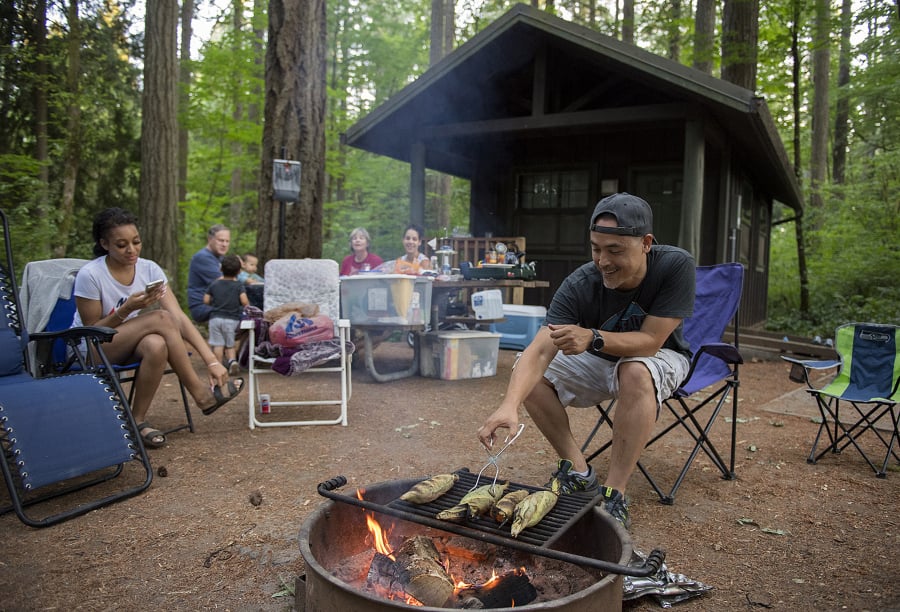BOISE, Idaho — Some litter is obvious — plastic bottles, beer cans and cigarette butts stick out like sore thumbs on the side of a trail.
But what about the other stuff, the food waste that surely will biodegrade in the woods? After all, apple cores and banana peels and dog poop are natural, right?
Nope.
“Can something be biodegradable and harmful to the environment? Possibly,” Evan Worthington, a Boise Bureau of Land Management wilderness ranger, told the Idaho Statesman. “We really lean on these words, ‘biodegradable’ and ‘natural.’ A Buick is biodegradable.”
Worthington has been an ambassador for the Leave No Trace Center for Outdoor Ethics for more than 10 years. Leave No Trace is an organization focused on educating people on how to responsibly enjoy nature — or, as Worthington calls it, “table manners for the outdoors.”
And that means not tossing your table scraps by the trailside, no matter how innocuous they might seem.
“If you wouldn’t find it in that area normally, it doesn’t belong on the ground,” Worthington said in an interview.
Those cigarette butts, bottles and wrappers can take five years or more to finally decompose. And even “healthy” food scraps can stick around for a while. Orange and banana peels can take up to two years to fully decompose, Leave No Trace reports.
What’s more, Idaho’s arid environment can further preserve litter, Worthington said.
The scoop on poop
A lot of Worthington’s Leave No Trace talks touch on litter and similar beginner topics, but he’s also an expert in what he calls “the scoop on poop” — and not just animal poop, but human waste of all kinds.
Worthington, with Idaho Trails Association board member Pam Bond, sometimes host feces-focused talks for outdoor recreationists. Bond began giving general talks on Leave No Trace’s Seven Principles and quickly found the topic people wanted to know most about was waste.
Worthington said he hopes the talks address some of the embarrassment or the “yuck” factor that can surround the topic.
“This is a common denominator between us, and it’s not something to be ashamed of, it’s not something to panic about,” Worthington said.
For the most part, things are pretty straightforward.
“Nothing earth-shattering has happened to how you pee in the woods,” Bond said.
It’s a rule of thumb to urinate at least 200 feet from a water source — unless you’re rafting or kayaking, in which case it’s a good idea to pee in the water. Urine is mostly water, so it will dilute in large bodies of water. Plus, this avoids creating smelly spots alongside rivers, where it may not be possible to move 200 feet from the water easily.
“The biggest thing is hygiene is so important,” Bond said.
That goes for all aspects of bodily functions.
“It’s not that big a deal to carry some wipes, hand sanitizer and a baggie to pack wipes out,” Worthington said. “You don’t want to find yourself with just dirt and cheatgrass.”
In some cases, it’s acceptable to dig a “cathole,” a small pit 6 to 8 inches deep and at least 200 feet from water sources. In other instances, the best practice is to pack out your own poo, as well as dog waste and toilet paper.
“We carry diseases,” Bond said. “This is my biggest pet peeve. It’s not that gross.”
Bond and Worthington also broach the topic of handling menstruation on multi-day trips. Essentially, the same rules apply. Pack wipes, sanitizer or latex gloves to keep things clean. Plan to pack out used tampons or pads, dig catholes to dispose of blood from reusable menstrual cups, and boil cups to keep them clean.
“It’s not just women who need to know these things,” Bond said. “If you’re a man and you have daughters and you want to take them hiking, you need to know this.”
And no, Bond said, bears are not attracted to women who are menstruating.
Litter management
Bond and Worthington both emphasized how important it is for everyone to understand the basics of good outdoor stewardship. That knowledge has become even more important as Idaho’s population skyrockets, Worthington said.
“The big thing that gets overlooked is population,” he said. “A lot of places aren’t visited by just two or three people anymore. (It’s a matter of) just accepting that people will be coming in behind you now.”
Worthington knows some people will balk at the idea of following all the rules.
“People look at it as ‘you’re killing the fun of things,’ ” Worthington said. “It’s not that we’re trying to eat into your fun. We’re trying to preserve the environment for everyone to enjoy.”



